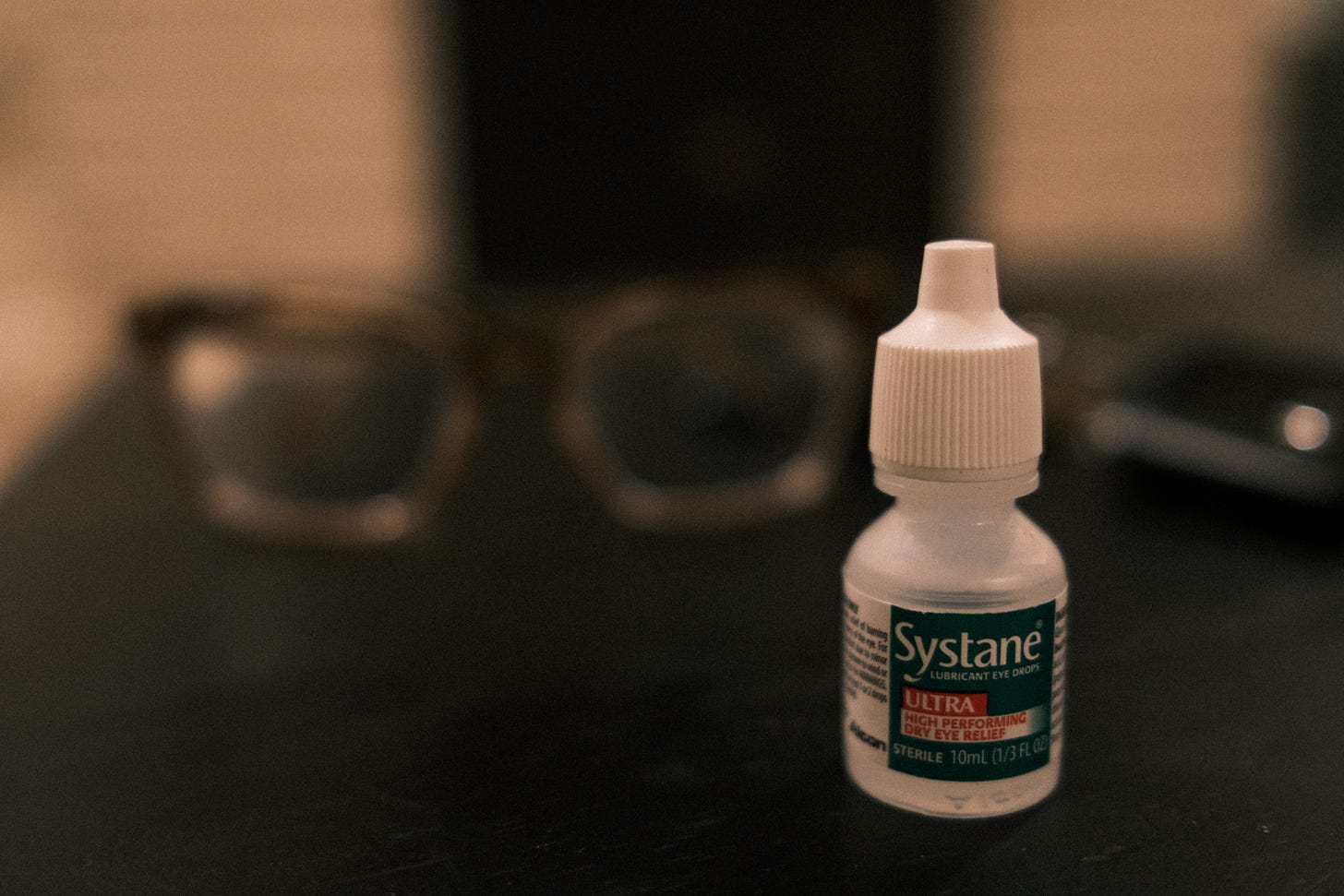Borrowed Tears are Good Enough
What LASIK recovery taught me about Living with Grief
Note to the Reader: In keeping with my commitment to use January for reflection, here’s another one from last year. Last July, in the days leading up to my 39th birthday, I started a 30-day series on Grief here at Four in the Morning (I never finished, only made it up to day 13—you can read the first 13 here). I promise to finish the remaining seventeen days after I get done with this more pressing project. So if you’re the praying type, keep me in yours. I’m getting away today to someplace VERY cold, locking myself in a hotel room for 3 days with about 50 books on grief, loss, patience, storytelling, and healing to finish up the last few thousand words of my final doctoral writing component. I hope to finish by Friday night—and then, new content here at Four in the Morning. Until then, enjoy what’s in front of you today. Remember, every new day begins in the dark.
Borrowed Tears are Good Enough
Three years ago, I learned a lesson about grief from getting LASIK that I’ll never forget.
Here’s what happened
One December afternoon in 2020, I walked into the eye doctor’s office with glasses and walked out never needing them again. After 28 years of wearing corrective lenses, I got LASIK and would forever see life clearly.
Or so I thought.
A few weeks later, I remember having this streak of waking up frustrated. I expected to wake up to a clear world, but it was just the opposite. Every morning I opened my eyes to a blurry and uncertain world. So many mornings, I forgot I had the surgery until I’d reach over to get my contacts and would find a small bottle of Visine (or Systane…it’s what they carry in CVS now) in its place.
And then I’d remember, my world wasn’t blurry because my vision was bad.
My world was blurry because my tears were gone.
Here’s the thing: it’s completely natural after an intense surgery like LASIK for your tear ducts to dry up. Your eyes have been traumatized as a pieces have been cut away. LASIK involves cutting through the cornea, which often results in temporary damage to some nerves as well as reduced sensation. In other words, the eyes don’t recognize the need for moisture, so they don’t (and sometimes can’t) produce enough tears.
And dry eyes produced blurred vision.
Remember:
“there are many things that can only be seen through eyes that have cried”
- Archbishop Oscar Romero
For several months, in order to see life clearly, I had to borrow tears. If I wanted to see life clearly, I had to have on my person (at all times) tears on loan until I could start producing them on my own.
And you know what?
Those borrowed tears were good enough.
They were good enough to help me correct my blurred vision after LASIK.
In the years following, different laser-less traumas have affected my ability to produce my own tears. I’ve learned to same lesson.
Borrowed tears are good enough
I’m thankful for all the people who have cried tears for my brother, for our struggle with infertility, for broken friendships, ruined relationships and a whole other host of ambiguous losses.
As time moves on, my eyes dry up, my heart grows cold, and life starts to get blurry. And then, someone comes along and in the course of conversation, they hear my pain, and they lend me their tears. (So often without me asking to borrow them). These tears always do something unexpected to me.
They remind me that my losses aren’t meant to get over or get past. They matter. Their tears help me see my life and surroundings clearly. Their tears have a way of rinsing the novocaine from my numb heart in order that I might feel, not just the pain of the event, but the comfort of not being alone.
And lately, those borrowed tears aren’t needed as much. For my LASIK or otherwise.
My eye ducts have recovered and tend to leak fine on their own.
In all of this, I’ve learned another lesson about how I’ve been changed.
I’m sure my grief has grown me in wisdom, but more than that, my grief has made me more generous with my tears.
I’ve been healed by borrowed tears deposited in the banks of these dry eyes.
Now, I think I’m ready for others to make withdraws—loaning them to my dear friends who need them.
That’s the purpose of these 30 Days of Hope. To remind you the reader that you’re not crazy.
You’re not alone.
You’re human.
Peace
Day 5/30 - 30 Days of Hope



The vulnerability is beautiful. Thank you family.
This is a great read. Very relatable. Have you seen the movie Origin? If not, I'd like to read your thoughts about the grief shown on screen. I connected with the film and its display of grief.